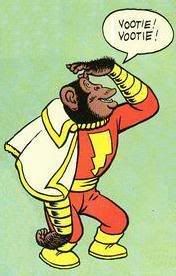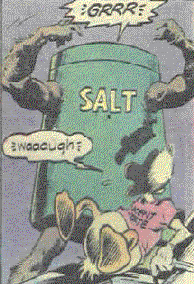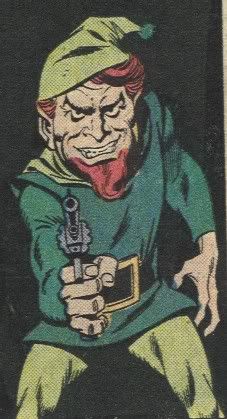You Know What Really Grinds My Gears?
Welcome to Grump Week. In honor of my sour mood, this week’s posts will be surly. *
*
The titular phrase was a gift from Peter Griffin, from Stewie Griffin: The Untold Story. Out of bile, I’m a’usin’ it too.
Thanks, Peter.
-----------------------
You know what really grinds my gears?
The inability of lots of comic fans to see the relationship between economics and the industry. For cryin' out loud, we even refer to it as an "industry."
Here’s a sample of twisted logic, common among the fanboy community, that made me want to grab the writer and shake him as though he were a toddler and I a British nanny: “The Silver Age comics were charming and innocent, because the creators loved their characters back then! Modern creators hate superheroes!”
Provocative! Insightful! Or…
…it could be that the market conditions of the fifties and sixties emphasized done-in-one-issue stories that maintained a status quo, were gently charming, and avoided upsetting the young target audience...
Perhaps?
Mmmaybe…?
Hey, wow, maybe modern trends, like “writing for the trade” and different themes are, perhaps, I don’t know, driven by market realities?
No, of course, it can’t be that. Things are different now because modern creators hate their characters and don’t care about the audience. How delightful!
What's more, you have the power to read peoples’ minds? Sweet. To have the psychic ability to read a comic and feel the author’s intent and degree of love…wow…that’s like...deep, man.
Or you could be making guesses based on your own tastes and expectations. Forming an interpretation, as it were, based on the limited evidence at hand.
Mmmmmaybe.
Naw, couldn’t be that.
“They didn’t kill and replace heroes back in the Silver Age! They didn’t have violent and nasty stories back then!”
Because they couldn’t.
Replace a major character? Fanboy, the irregular delivery mechanisms of the newsstand made it hard to tell extended stories of any sort. You think a company would risk its big trademarks by playing switcharoo given that kind of instability? The chance of a kid getting his mitts on six consecutive issues of a comic in 1970 were dicey at best.
As far as violence and disturbing stories, graphic violence and the accompanying parental outrage killed EC Comics back in the mid-fifties. You think the other companies may have noticed that? Adult themes (or, to be honest about modern comics, "adult-esque themes") weren't safe for them to publish, lest Ma and Pa pitch a fit.
The target audience today is wildly different than in days of yore. The crowd is much older and it comes back month after month, sticking with a title for years on end. Old-style comics were created with constant reader churn in mind. Today’s comics are created with exactly the opposite idea.
You don’t think that’s going to have a massive effect on the stories the companies sell?
Fanboy, please.
I understand if you prefer the old approach. I dig it too. But don’t fool yourself for a second with the thought that the changes were the product of arbitrary malice. That charge is the “kids today are a bunch of ingrates” argument applied to comics, a simple resentment of change couched in the rhetoric of artistic integrity.
Sure, it’s a fun story to tell yourself and lets you drink deep from the intoxicating liquor of righteous outrage, but it’s also a steaming pile of bullshit.
Accept the truth: the stories changed because the business circumstances changed. On the large scale, the business drives the stories, not the other way around.
Comic companies are willfully myopic as well. “Why aren’t you branching out and buying new series? Fans hate new concepts! They only want old stuff recycled!”
They choose to forget that comics are now at least three bucks a pop and expressly designed to keep the readers coming back month after month. Then there's the proliferation of series based on the most popular characters, drawing away still more money from the fans. And still they act surprised by conservative buying habits? Que?
I used to read The Amazing Spider-Man. But there are three, four, maybe even five Spidey titles on the market at once, and when these many series interlock for a big fat crossover, do you seriously expect me, or anyone, to cough up an extra twelve or fifteen bucks a month for several months?
If I do, I'm straining my comic-buying budget. If I ignore the crossover and continue to buy only the one comic I like, I'm getting several months of incoherent, fragmented stories. Which is a waste of my comic-buyin' dollar.
They know this and bitch anyway, hoping we'll be guilted into buying still more comics. That's what the complaint is: a guilt trip.
Guilting loyal customers?
Is there any response to this tack more appropriate than a single upraised middle finger? I think not.
GYAAAAHH!!
--------------------------
*The actual source of the foul mood is not comic-based, but I'm not going to vent about the evils of insurance companies on a comic book blog. I thought I'd instead apply my backed-up bile to finally post on The Things I Think But Do Not Say. May as well, while I'm still all het up. I'll try not to slip into politics this week, but I can't promise anything.
 *
*The titular phrase was a gift from Peter Griffin, from Stewie Griffin: The Untold Story. Out of bile, I’m a’usin’ it too.
Thanks, Peter.
-----------------------
You know what really grinds my gears?
The inability of lots of comic fans to see the relationship between economics and the industry. For cryin' out loud, we even refer to it as an "industry."
Here’s a sample of twisted logic, common among the fanboy community, that made me want to grab the writer and shake him as though he were a toddler and I a British nanny: “The Silver Age comics were charming and innocent, because the creators loved their characters back then! Modern creators hate superheroes!”
Provocative! Insightful! Or…
…it could be that the market conditions of the fifties and sixties emphasized done-in-one-issue stories that maintained a status quo, were gently charming, and avoided upsetting the young target audience...
Perhaps?
Mmmaybe…?
Hey, wow, maybe modern trends, like “writing for the trade” and different themes are, perhaps, I don’t know, driven by market realities?
No, of course, it can’t be that. Things are different now because modern creators hate their characters and don’t care about the audience. How delightful!
What's more, you have the power to read peoples’ minds? Sweet. To have the psychic ability to read a comic and feel the author’s intent and degree of love…wow…that’s like...deep, man.
Or you could be making guesses based on your own tastes and expectations. Forming an interpretation, as it were, based on the limited evidence at hand.
Mmmmmaybe.
Naw, couldn’t be that.
“They didn’t kill and replace heroes back in the Silver Age! They didn’t have violent and nasty stories back then!”
Because they couldn’t.
Replace a major character? Fanboy, the irregular delivery mechanisms of the newsstand made it hard to tell extended stories of any sort. You think a company would risk its big trademarks by playing switcharoo given that kind of instability? The chance of a kid getting his mitts on six consecutive issues of a comic in 1970 were dicey at best.
As far as violence and disturbing stories, graphic violence and the accompanying parental outrage killed EC Comics back in the mid-fifties. You think the other companies may have noticed that? Adult themes (or, to be honest about modern comics, "adult-esque themes") weren't safe for them to publish, lest Ma and Pa pitch a fit.
The target audience today is wildly different than in days of yore. The crowd is much older and it comes back month after month, sticking with a title for years on end. Old-style comics were created with constant reader churn in mind. Today’s comics are created with exactly the opposite idea.
You don’t think that’s going to have a massive effect on the stories the companies sell?
Fanboy, please.
I understand if you prefer the old approach. I dig it too. But don’t fool yourself for a second with the thought that the changes were the product of arbitrary malice. That charge is the “kids today are a bunch of ingrates” argument applied to comics, a simple resentment of change couched in the rhetoric of artistic integrity.
Sure, it’s a fun story to tell yourself and lets you drink deep from the intoxicating liquor of righteous outrage, but it’s also a steaming pile of bullshit.
Accept the truth: the stories changed because the business circumstances changed. On the large scale, the business drives the stories, not the other way around.
Comic companies are willfully myopic as well. “Why aren’t you branching out and buying new series? Fans hate new concepts! They only want old stuff recycled!”
They choose to forget that comics are now at least three bucks a pop and expressly designed to keep the readers coming back month after month. Then there's the proliferation of series based on the most popular characters, drawing away still more money from the fans. And still they act surprised by conservative buying habits? Que?
I used to read The Amazing Spider-Man. But there are three, four, maybe even five Spidey titles on the market at once, and when these many series interlock for a big fat crossover, do you seriously expect me, or anyone, to cough up an extra twelve or fifteen bucks a month for several months?
If I do, I'm straining my comic-buying budget. If I ignore the crossover and continue to buy only the one comic I like, I'm getting several months of incoherent, fragmented stories. Which is a waste of my comic-buyin' dollar.
They know this and bitch anyway, hoping we'll be guilted into buying still more comics. That's what the complaint is: a guilt trip.
Guilting loyal customers?
Is there any response to this tack more appropriate than a single upraised middle finger? I think not.
GYAAAAHH!!
--------------------------
*The actual source of the foul mood is not comic-based, but I'm not going to vent about the evils of insurance companies on a comic book blog. I thought I'd instead apply my backed-up bile to finally post on The Things I Think But Do Not Say. May as well, while I'm still all het up. I'll try not to slip into politics this week, but I can't promise anything.





2 Comments:
Today's comic buyers are, in fact, older. And that does effect the stories they are selling.
But where do tomorrow's comic buyers come from, if Marvel and DC aren't sowing seeds among the kids?
Another problem with serving the older readers is that they've seen it all, so creators need to keep cranking up the sensational violence, or they need to come up with poorly-conceived 'events' in hopes of keeping an aging audience interested.
I suppose Marvel and DC could start writing plots geared to the AARP set...
I think comics would be better if they weren't written by the jaded for the jaded.
By Anonymous, at 7:55 PM
Anonymous, at 7:55 PM
I agree with you completely. One hundred percent.
My gripe was that to claim the changes in comics were brought about purely by the malice of uncaring, "too-cool-for-comics" creators, is brainless.
The changes were brought about by real factors. How they responded to the changes, well, that's another story.
A useful maxim: "Never ascribe to malice what could also be ascribed to stupidity." Though in the current case, I think that's a bit harsh.
The Silver Age ended with comics dying out. Read interviews with Kirby and Chaykin--in 1970, comics were dying. They changed out of necessity. If you don't like what they became, that's fine and dandy; but don't impugn the motives of the creators who did it.
By Harvey Jerkwater, at 8:13 AM
Harvey Jerkwater, at 8:13 AM
Post a Comment
<< Home